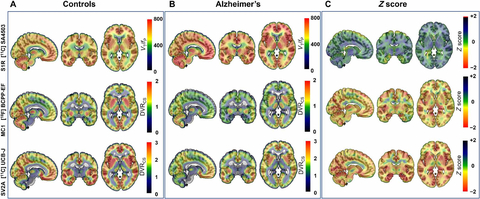Invicro LLC (Invicro), a global, industry-leading imaging CRO, and a subsidiary of REALM IDx, Inc., today announced the publication of the paper “Widespread cell stress and mitochondrial dysfunction occur in patients with early Alzheimer’s disease 1” in Science Translational Medicine.
NEEDHAM, Mass.--(BUSINESS WIRE)-- Invicro LLC (Invicro), a global, industry-leading imaging CRO, and a subsidiary of REALM IDx, Inc., today announced the publication of the paper “Widespread cell stress and mitochondrial dysfunction occur in patients with early Alzheimer’s disease1” in Science Translational Medicine.
This press release features multimedia. View the full release here: https://www.businesswire.com/news/home/20220818005136/en/

Figure 1: Mean PET images demonstrating AD patients have widespread increases in sigma 1 receptor, along with regional decreases in mitochondrial complex I and SV2A. (Graphic: Business Wire)
The study provides novel in vivo evidence for widespread, clinically relevant cellular stress and bioenergetic abnormalities in patients with early-stage Alzheimer’s Disease (AD) and highlights the potential value of mitochondrial imaging in longitudinal studies of AD.
“Invicro’s research and novel biomarkers are significant for the progression of clinical trials in AD and neurodegenerative disorders, and we are delighted to see this important work published in Science Translational Medicine,” said Dr. Roger Gunn, CSO, Neuroscience, for Invicro. “This work further extends Invicro’s repertoire of biomarkers for use in AD clinical trials.”
Position emission tomography and magnetic resonance imaging markers were utilized to show that cell stress and impaired oxidative phosphorylation are central to mechanisms of synaptic loss and neurodegeneration in the cellular pathology of AD. Compared to controls, AD patients had widespread increases in sigma 1 receptor, along with regional decreases in mitochondrial complex I, SV2A, brain volume and cerebral blood flow. Furthermore, significant reductions in mitochondrial density were seen in AD patients over a 12–18-month period, indicating this biomarker may be suitable for use in early-stage trials of novel disease-modifying treatment for this devastating disease.
This study was led by Professor Paul Matthews of the UK Dementia Research Institute and Imperial College London as part of the multi-arm, pre-competitive consortium, Molecular Imaging of Neurodegenerative Disease — Mitochondria Associated Proteins and Synapses (MIND MAPS) AD cohort. The MIND MAPS consortium was developed and is headed by Dr. Eugenii Rabiner, EVP for Translational Imaging at Invicro.
“MIND MAPS is an important industry-academic collaboration that is bringing together experts from across the globe. It was developed with the aim of characterizing imaging biomarkers of the neurodegenerative process to address important problems in the development of novel medication for neurodegenerative disease,” said Dr. Rabiner. “Together, we have shown that mitochondrial and cellular stress biomarkers open the promise of better monitoring of the therapeutic potential of these drugs.”
Science Translational Medicine is the leading weekly online journal publishing translational research at the intersection of science, engineering and medicine. The goal of Science Translational Medicine is to promote human health by providing a forum for communicating the latest research advances from biomedical, translational and clinical researchers from all established and emerging disciplines relevant to medicine. Science Translational Medicine published “Widespread cell stress and mitochondrial dysfunction occur in patients with early Alzheimer’s disease” on August 17, 2022.
- “Widespread cell stress and mitochondrial dysfunction occur in patients with early Alzheimer’s disease” Authors: Ashwin V Venkataraman, Ayla Mansur, Gaia Rizzo, Courtney Bishop, Yvonne Lewis, Ece Kocagoncu, Anne Lingford-Hughes, Mickael Huiban, Jan Passchier, James B. Rowe, Hideo Tsukada, David J. Brooks, Laurent Martarello, Robert A. Comley, Laigao Chen, Adam J. Schwarz, Richard Hargreaves, Roger N. Gunn, Eugenii A. Rabiner, and Paul M. Matthews
About Invicro
Headquartered in Needham, MA, Invicro, a subsidiary of REALM IDx, was founded in 2008 with the mission of improving the role and function of imaging in translational drug discovery and development across all therapeutic areas. Today, Invicro’s multi-disciplinary team provides solutions to pharmaceutical and biotech companies across all stages of the drug development pipeline (preclinical through Phase 0-IV), all imaging modalities and all therapeutic areas, including neurology, oncology and systemic and rare diseases. Invicro’s quantitative biomarker services, advanced analytics and AI tools, and clinical operational services are backed by Invicro’s industry-leading software informatics platforms, VivoQuant® and iPACS®, as well as their pioneering IQ-Analytics Platform, which includes AmyloidIQ, TauIQ and DaTIQ.
Invicro operates out of nine global laboratories, clinics and sites within the United States in Massachusetts, Michigan, California, Connecticut and globally in the United Kingdom, India, Japan and China. For more information visit www.invicro.com
View source version on businesswire.com: https://www.businesswire.com/news/home/20220818005136/en/
Source: Invicro LLC







